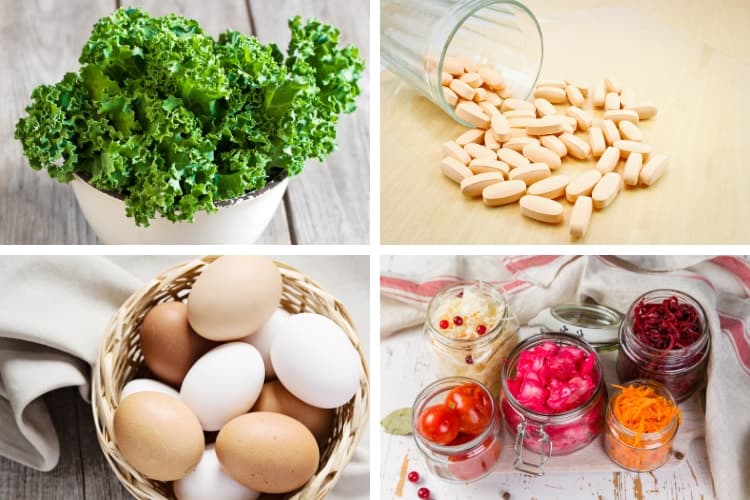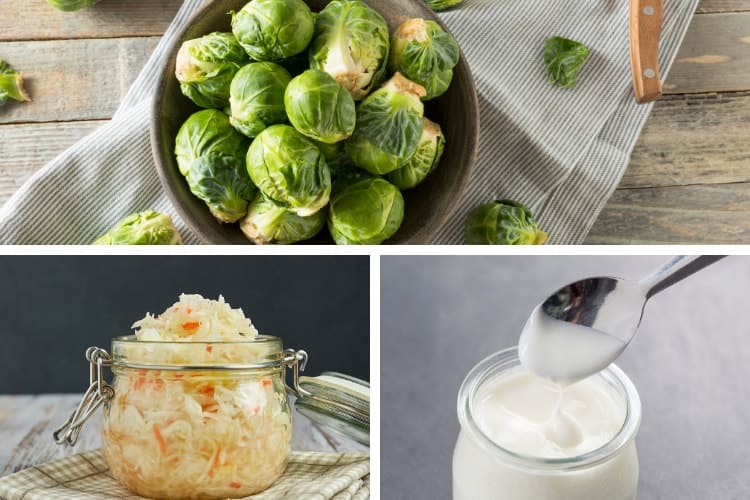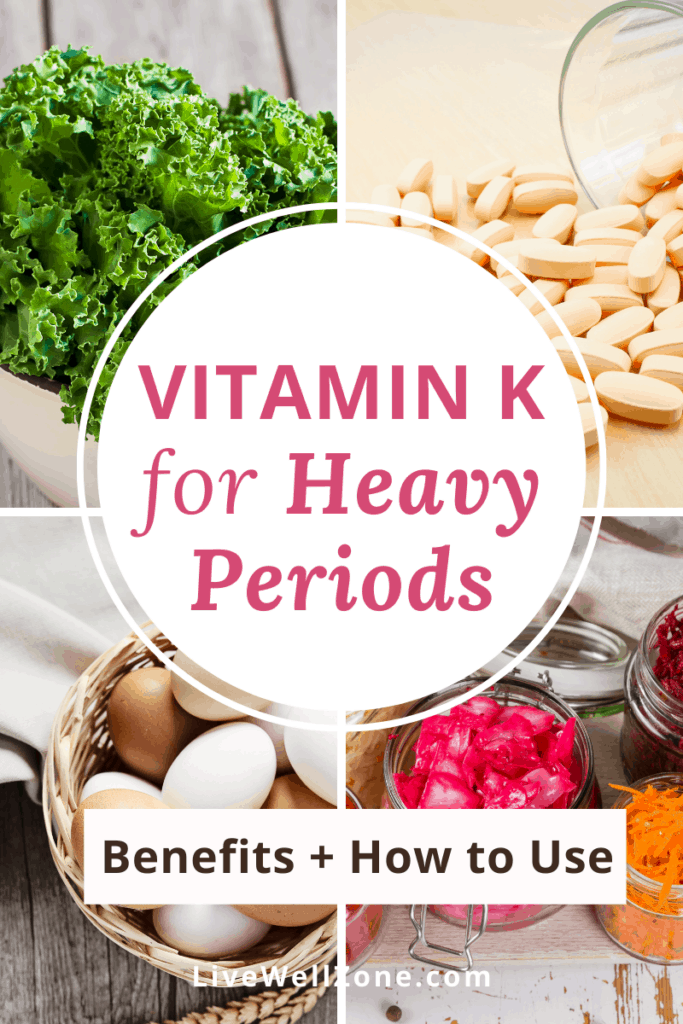
As far as natural remedies for heavy menstrual cycles go, vitamin K is one of the least talked about. Yet this fat-soluble vitamin is critical for curbing all types of profuse blood loss. In addition, it may also play a role in regulating estrogen.
So, in this article we’re going to look at the main benefits of vitamin K for heavy periods, as well as:
- Food sources of vitamin K.
- How much vitamin k we should be consuming.
- Things to know about vitamin K supplementation and injections.
CAN VITAMIN K DEFICIENCY CAUSE HEAVY MENSTRUAL BLEEDING?
According to a paper published in The Journal of the Canadian Chiropractic Association, vitamin K deficiency is one of the many things that can cause heavy periods (or menorrhagia). The main reason why insufficient vitamin K can contribute to a heavy flow is because vitamin K is necessary for blood clotting.
Therefore, anything that creates abnormalities in blood clotting has the potential to affect blood loss during your period.
As a side note, it’s worth noting that the paper has three different categories for the causes of heavy cycles. Those categories are:
- Blood clotting issues related to vitamin K deficiency or the presence of coagulation inhibitors (i.e. things that interfere with the proteins that are responsible for clotting).
- Hormonal imbalances such as hypothyroidism and anovulation (lack of ovulation).
- Mechanical issues such as endometriosis and endometritis (inflammation of the uterine lining).
IS VITAMIN K GOOD FOR HEAVY PERIODS?
Aside from its role in blood clotting, some research indicates that vitamin K also affects estrogen metabolism. This dual role in balancing the thickness/fluidity of blood and as well as in regulating estrogen, means that vitamin K might be a beneficial home remedy for profuse period bleeding.
Now, let’s take a closer look at both of these benefits to understand how they can impact the monthly cycle.
1. Vitamin K and Estrogen Metabolism
A 2005 study showed that vitamin K regulates estrogen metabolism and affects the ratio of estradiol to estrone. Based on these findings, the researchers concluded that this suggests “a possible novel role for vitamin K in modulating estrogen function.” (source).
While more studies are needed to understand exactly how vitamin K regulates estrogen, this gives us some insight into why vitamin K could help with heavy cycles.
After all, heavy periods are usually accompanied by a thick endometrium.
And the hormone that thickens the endometrium is estrogen. So, if there’s too much estrogen, then it’s more likely that the endometrium will be thicker and subsequently, there will be more blood loss when the uterine lining sheds.
So from this perspective, maintaining sufficient vitamin K levels might help your cycle.
2. Vitamin K and Blood Clotting
Blood coagulation (aka clotting) and anticoagulation are both necessary for the body to function properly. And vitamin K is necessary for the production of proteins that affect both processes.
Now, as we saw earlier, some experts state that clotting abnormalities can be an underlying cause of heavy cycles.
So, if you’re losing a lot of blood each month, it’s worth ensuring that you’re getting enough vitamin K in your diet.
BEST VITAMIN K FOODS TO REDUCE A HEAVY MENSTRUAL FLOW

Before we dive into the food sources of vitamin K, we need to first talk about the 2 main types of vitamin K.
- Vitamin K1: aka phylloquinone, this type is found mainly in plant foods (particularly leafy greens).
- Vitamin K2: this is found only in fermented foods and animal foods. In addition, our gut bacteria makes K2.
Many people believe that vitamin K1 is more important for blood clotting than vitamin K2. However, K2 may also be just as important.
In fact, one study showed that one serving of natto (a fermented soy food) had a positive effect on blood clotting for several days. Furthermore, the effect was stronger than that produced by foods rich in K1 (source).
So, a healthy mix of both vitamins K1 and K2 in the diet would be the best approach.
One thing that’s important to know about vitamin K is that it is fat-soluble. However, unlike other fat soluble vitamins like A, D and E – which the body stores in fat tissues – vitamin K is not stored in fat tissues.
So, regular consumption of vitamin K-rich foods is important. Below is a list of foods that are good sources of each type of vitamin k (source).
Foods that are good sources of vitamin K1:
- Spinach
- Beet greens
- Kale
- Cabbage
- Collard greens
- Parsley
- Turnip greens
- Brussels sprouts
- Broccoli
- Scallions
Foods that are good sources of vitamin K2:
- Organic cheese
- Organic yogurt
- Natto
- Beef liver
- Eggs
- Chicken
- Goose liver paste
Before we wrap up this section, please remember that vitamin K is fat-soluble. Therefore eating it with other natural fats (such as avocado or olive oil) will facilitate its absorption.
VITAMIN K DOSAGE FOR EXCESSIVE PERIOD BLEEDING
While there’s no strict dosage for the amount of vitamin K that will help with excessive period bleeding, there are guidelines on vitamin K consumption for the general population. Here’s what it looks like (source):
| Girls 14 – 18 | 75 micrograms per day |
| Women 19 and above | 90 micrograms per day |
When it comes to supplements, many multivitamins contain vitamin K, usually in amounts that are equivalent to about 75% of the recommended daily intake.
In addition, you can find vitamin K-only supplements, as well as vitamin K in combination with other nutrients (such as vitamin D, which also helps with vitamin K absorption).
Depending on the brand, you will find a wide range of doses, with some providing as much as 5000% more than the recommended intake.
Given the variance in doses, it’s best to work with a doctor who can evaluate your hormones and the underlying cause(s) of your heavy cycles. This will allow your doctor to determine a supplementation dose that is ideal for your specific needs.
VITAMIN K INJECTION FOR HEAVY MENSTRUAL BLEEDING: THINGS TO CONSIDER
If deemed necessary by your doctor, you can get a vitamin K injection to help with excessive period bleeding.
In this case, the injection is usually given at a rate of no more than 1mg per minute (source).
However, this is just a general guideline.
Depending on your specific healthy history and your current symptoms, your doctor may go with a different dosage.
RELATED QUESTIONS ABOUT VITAMIN K AND MENORRHAGIA
Is it safe to take vitamin K everyday?
While you can eat vitamin-K rich foods regularly, you might experience negative side effects when you combine these foods (or the supplements or injection) with some medications. For example, vitamin K can interact negatively with things like:
- Blood thinners.
- Antibiotics.
- Antacids.
- Cholesterol, seizure and cancer medication.
How much Vitamin K is too much?
In general, anything above 1mg of vitamin K in supplement form is considered too much and might be harmful (source).
However, the only way to know for sure is to work with a doctor who can help you figure out the best dosage for you.
What are the side effects of vitamin K?
Some people might experience upset stomach and diarrhea when taking vitamin K.
CONCLUSION
Although vitamin K often goes unnoticed, it provides some major benefits that could help ease that time of the month.
Thankfully, there’s an abundance of foods that are rich in vitamin K, making it very easy for you to get what you need from your diet!

You Might Also Like:
5 Science-Backed Reasons To Use Stinging Nettle for Menopause
A Complete Guide to Using Vitamin C for Heavy Menstrual Bleeding
10 Herbs for Heavy Menstrual Bleeding (That You Need To Know!)
3 Reasons To Use Blackstrap Molasses for Heavy Periods

